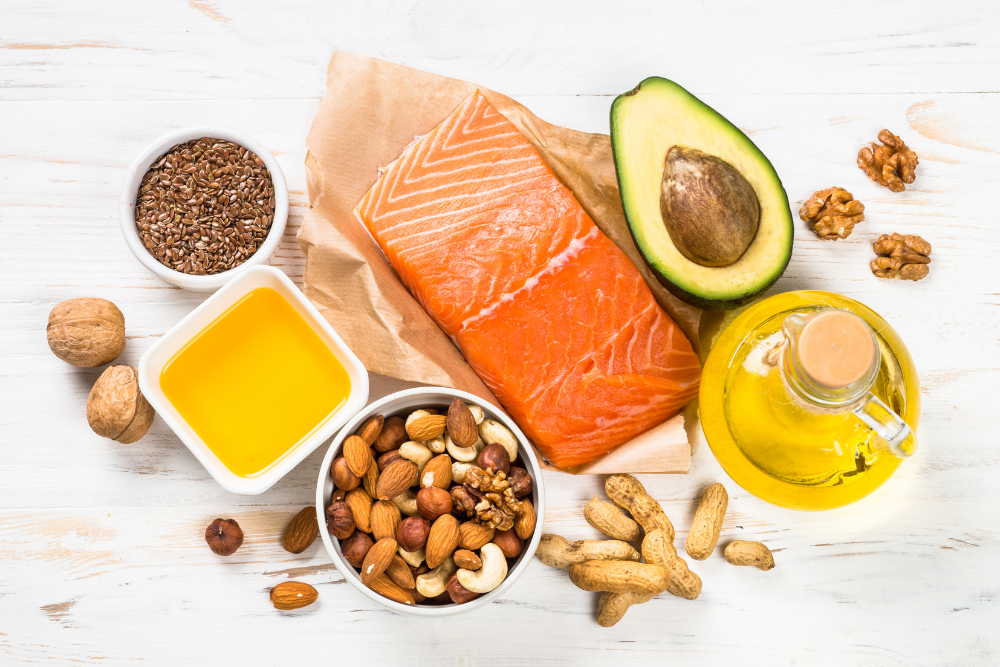As you enter menopause, you might notice a shift in your body weight. Understanding and managing weight gain during menopause doesn’t have to be a struggle. Welcome to our comprehensive guide on “How to Lose Menopause Weight.”
This article is designed to help you navigate the challenges posed by menopause-related weight gain. We explore effective strategies, from diet modifications to lifestyle changes, that are specifically designed for women experiencing menopausal changes. Whether embracing a new exercise routine or understanding hormonal imbalances, our expert tips will guide you towards achieving better health during this transformative phase.
Understanding Menopause Weight Gain
Menopause is a significant life stage for women, typically occurring between the ages of 45 and 55. It marks the end of menstrual cycles and is confirmed when a woman hasn’t had a period for 12 consecutive months. This period brings about various physiological changes, one of which is often weight gain. Understanding this weight gain is essential in managing it effectively.
Hormonal Changes
The primary reason behind weight gain during menopause is hormonal changes. The decline in oestrogen levels during menopause can lead to a shift in fat distribution, causing more fat to accumulate around the abdomen rather than the hips and thighs. This change affects body shape and has implications for health, as abdominal fat is linked with higher risks of heart disease and diabetes.
Metabolic Rate
The metabolic rate tends to slow down with age, and this slowdown is accentuated during menopause. A slower metabolism means the body burns fewer calories at rest, which can lead to weight gain unless dietary habits are adjusted accordingly.
Muscle Mass
As women age, they naturally lose muscle mass, a condition known as sarcopenia. Since muscle burns more calories than fat, this loss of muscle mass can further reduce metabolic rate, making it easier to gain weight.
Lifestyle Factors
Lifestyle factors also play a significant role. Menopausal women might experience sleep disturbances, increased stress, and mood changes, all of which can contribute to changes in eating habits and physical activity levels.
Insulin Resistance
Women in their menopausal years are more likely to develop insulin resistance. This means the body isn’t as effective at lowering blood sugar levels, which can lead to increased fat storage, especially around the midsection.
Understanding menopause and these factors is the first step towards managing menopause-related weight gain. It’s not just about dietary changes; it’s a holistic approach that includes understanding the physiological changes, adapting lifestyle choices, and possibly seeking guidance from healthcare professionals.

Healthy Eating Habits for Menopause Weight Loss
Navigating the symptoms of menopause requires a mindful approach to eating, as the body’s needs and responses to food change during this period. Adopting healthful eating habits can significantly aid in managing menopause-related weight gain. Here’s a guide to help you create a balanced diet tailored to the needs of menopausal weight loss.
Focus on Nutrient-Dense Foods
Fruits and Vegetables: Load your plate with a variety of fruits and vegetables. They are high in vitamins, minerals, and fibre yet low in calories, making them ideal for weight management.
Whole Grains: Incorporate whole grains like quinoa, brown rice, barley, and whole wheat. These are rich in fibre, helping you feel full longer and aiding digestion.
Lean Proteins: Opt for lean protein sources such as fish, poultry, tofu, legumes, and beans. Protein is essential for maintaining muscle mass, which is important during menopause.
Healthy Fats
Include sources of healthy fats in your diet, including avocados, nuts, seeds, and olive oil. These fats are important for hormone health and can also keep you satiated.
Stay Hydrated
Drink plenty of water throughout the day. Sometimes, thirst can be mistaken for hunger. Staying hydrated also aids in digestion and metabolism.
Reduce Intake of High-Calorie and Processed Foods
Limit the intake of processed foods, sugary snacks, and high-calorie beverages. These can contribute to weight gain and provide little nutritional value.
Calcium and Vitamin D
Ensure adequate calcium and vitamin D intake to support bone health, which is vital during and after menopause. Sources include dairy products, fortified foods, and sunlight for vitamin D.
Mindful Eating
Practise mindful eating by taking time to enjoy your food and paying attention to hunger and fullness cues. This can help prevent overeating and emotional eating, and improve your relationship with food.
Regular Meal Times
Stick to regular meal times to avoid snacking on unhealthy options and to maintain stable energy levels throughout the day.
Limit Alcohol and Caffeine
Moderation is key with alcohol and caffeine, as they can affect sleep patterns and potentially lead to weight gain.
Remember, there’s no one-size-fits-all eating plan for menopause weight loss. It’s about finding a balanced, nutritious diet that meets your body’s changing needs. Consulting a nutritionist or dietitian can provide personalised guidance tailored to meet your health goals during menopause.

Effective Exercise Routines during Menopause
Exercise is a key component in managing weight during menopause. As the body undergoes hormonal and metabolic changes, adapting your exercise routine can help counteract weight gain, improve mood, and maintain overall health. Here’s how to create an effective exercise regimen during menopause:
Aerobic Exercise
Frequency and Duration: Aim for at least 150 minutes of moderate or 75 minutes of vigorous aerobic exercise per week. This can be broken down into shorter sessions spread throughout the week.
Types of Activities: Include brisk walking, cycling, swimming, dancing, or jogging. These activities help burn calories, improve heart health, and increase energy levels.
Strength Training
Importance for Muscle Mass: Engaging in strength training exercises at least two days a week is vital. It helps combat the loss of muscle mass, a common issue during menopause.
Types of Exercises: Use free weights, resistance bands, or body-weight exercises like squats, lunges, and push-ups. This not only aids in maintaining muscle mass but also supports a healthy metabolism and reduce body fat.
Flexibility and Balance Training
Yoga and Pilates: Incorporating yoga or Pilates into your routine can improve flexibility, balance, and core strength. This is particularly important as it can help prevent falls and improve posture.
Stretching: Regular stretching should also be a part of your exercise routine to maintain flexibility and reduce the risk of injuries.
Low-Impact Exercises
Suitable Options for Joint Health: If you have joint pain or arthritis, which can worsen during menopause, opt for low-impact exercises like swimming, cycling, or using an elliptical machine.
Regular Walking: Walking is an excellent low-impact exercise that can be easily incorporated into daily life.
Mind-Body Connection
Stress Reduction: Engage in activities that reduce stress, such as tai chi or gentle yoga. Managing stress is crucial as it can impact hormonal balance and weight.
Mental Health: Regular exercise improves mental health, reducing symptoms of depression and anxiety that may accompany menopause. Learn more ways to manage your mental health.
Consistency and Enjoyment
Finding Activities You Enjoy: Choose activities you enjoy and look forward to. This will increase the likelihood of sticking with your exercise routine.
Consistent Schedule: Try to exercise at the same time each day to develop a consistent habit.
Listening to Your Body
Adjust Intensity as Needed: Be mindful of how your body feels. Menopause can bring days of fatigue or discomfort; adjust your exercise intensity accordingly.
Seek Medical Advice: If you have health concerns, consult a healthcare provider before starting a new exercise routine.
Remember, the goal is to find a balanced approach that incorporates various types of exercise to address the unique challenges of menopause. It’s not just about weight loss, but also about maintaining strength, flexibility, and overall well-being.

Managing Stress for Successful Menopause Weight Loss
During menopause, the body goes through physical changes and faces emotional and psychological challenges. Stress management is paramount, as high stress levels can contribute to weight gain, especially around the midsection (e.g. belly fat). Here’s how to effectively manage stress and successfully lose weight during menopause.
Practice Mindfulness: Engaging in mindfulness practices can help you stay present and reduce overall stress levels. Techniques like deep breathing, guided imagery, or meditation can be especially beneficial.
Regular Meditation: Setting aside time for meditation daily can significantly lower stress hormones, such as cortisol, which are linked to weight gain.
Yoga and Tai Chi
Yoga: Yoga is not only great for physical fitness but also for reducing stress and anxiety. The combination of physical postures, breathing exercises, and meditation can be particularly effective.
Tai Chi: This gentle form of martial arts focuses on slow, deliberate movements and deep breathing, ideal for stress reduction.
Adequate Sleep
Prioritise Sleep: Lack of sleep can exacerbate stress and lead to hormonal imbalances that foster weight gain. Aim for 7-9 hours of quality sleep each night.
Good Sleep Hygiene: Establish a calming bedtime routine and create a sleep-conducive environment in your bedroom.
Healthy Social Connections
Social Support: Maintain strong social connections. Sharing your experiences with friends, family, or support groups can provide emotional relief and reduce stress.
Seek Professional Help: If you find stress overwhelming, consider talking to a mental health professional who can provide coping strategies.
Healthy Diet and Nutrition
Avoid Stress Eating: Be mindful of stress-induced eating habits. Opt for a balanced diet rich in fruits, vegetables, whole grains, and lean proteins.
Limit Caffeine and Alcohol: These can affect your stress levels and sleep quality, so it’s wise to consume them in moderation.
Regular Physical Activity
Exercise as a Stress Reliever: Regular physical activity is a powerful stress reliever. It boosts endorphins, improves mood, and can be a great way to manage menopausal symptoms, including weight.
Hobbies and Interests
Engage in Enjoyable Activities: Spend time doing activities you enjoy, whether gardening, painting, reading, or other hobbies. This can be a great way to divert your mind from stress.
By incorporating these strategies into your daily life, you can manage stress more effectively, which is vital for maintaining a healthy weight during menopause. Remember, managing stress is not just about reducing symptoms; it’s about enhancing your overall quality of life during this significant transition.

Importance of Adequate Sleep for Weight Control
Adequate sleep plays a pivotal role in weight control, especially during menopause. If you’ve ever wondered, “What happens when you sleep?”. It’s during sleep when the body performs critical functions, including the regulation of hormones that control appetite, metabolism, and stress.
Lack of sufficient sleep can disrupt these hormonal balances, particularly the ghrelin and leptin levels. Ghrelin, known as the ‘hunger hormone,’ stimulates appetite, while leptin signals satiety to the brain. When sleep-deprived, ghrelin levels spike, and leptin levels drop, leading to increased hunger and appetite, often resulting in overeating and gaining weight. This imbalance can be particularly challenging during menopause when hormonal fluctuations are already influencing weight.
Furthermore, inadequate sleep can increase stress and fatigue, reducing the motivation for physical activity and leading to a more sedentary lifestyle. It also impacts insulin sensitivity, increasing the risk of weight gain and type 2 diabetes.
Therefore, prioritising good sleep hygiene and learning how to get a better night’s sleep is essential for weight management during menopause. This includes establishing a regular sleep schedule, creating a comfortable sleep environment, and adopting relaxation techniques to improve sleep quality. Ensuring a good night’s sleep can better regulate appetite, boost metabolism, and maintain a healthy weight throughout menopause.
Incorporating Strength Training in Your Menopause Fitness Plan
Incorporating strength training into your fitness plan during menopause is helpful for several reasons. As oestrogen levels decline, women are at an increased risk of losing muscle mass and bone density, a condition known as osteoporosis.
Strength training, involving weight-bearing exercises like lifting weights, using resistance bands, or performing body-weight exercises such as squats and push-ups, helps counteract these effects. It preserves and builds muscle mass, which naturally declines with age, and strengthens bones, boosts metabolism, and improves body composition by increasing the ratio of muscle to fat.
This shift is vital for weight management during menopausal weight gain, as a higher muscle mass means a more efficient calorie burn, even at rest. Strength training enhances overall physical strength, balance, and posture, contributing to better health and reduced risk of injury in daily activities.

Celebrating Small Victories on Your Menopause Weight Loss Journey
Acknowledging and celebrating small victories is key to maintaining a healthy weight during your menopause journey. Menopause is a time of significant change, and managing weight can be challenging. Therefore, it’s important to recognise the end goal and the small steps you take towards it. Whether it’s sticking to your weekly exercise routine, choosing a well-balanced meal over a tempting snack, sleeping a full night, or even feeling more energetic and positive, each of these accomplishments is a milestone.
Celebrating these moments helps to build motivation and self-esteem, reinforcing positive behaviour. Remember, the journey towards weight management during menopause is not just about the numbers on the scale but about overall health, well-being, and the daily choices you make. Each small victory is a testament to your commitment and progress, deserving recognition and celebration.




